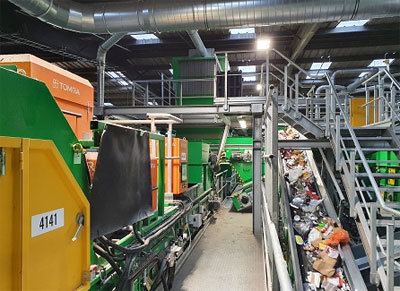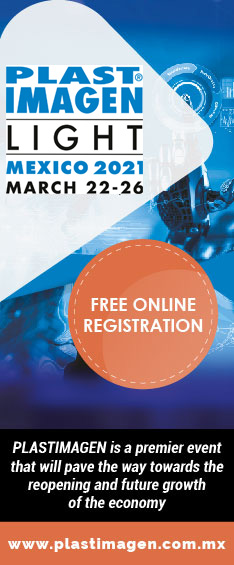| Plastics News |
Tomra Sorting Recycling and Stadler UK Limited chosen as technology providers for Viridor’s £15.4m Masons MRF transformation
January, 13, 2021 - In 2019, Stadler UK Limited was appointed by Viridor as one of two main contract partners for the £15.4m upgrade of its Masons Materials Recycling Facility (MRF) near Ipswich, modernising the facility as part of a ten-year Viridor-Suffolk County Council contract renewal. Viridor runs the MRF on behalf of the Suffolk Waste Partnership. Viridor specified Tomra Sorting Recycling’s sensor-based sorting solutions in its tender documentation for the upgrade. Having already worked together on several projects around the world, Stadler and Tomra worked in close collaboration from the earliest stages of the tender enquiry to ensure the plant and equipment met Viridor’s specific requirements. By investing heavily in the plant upgrade, Viridor has been able to transform its operations, increasing capacity from 65,000tpa to 75,000tpa (equivalent to 17 tonnes per hour). The plant is now operating at full capacity and at optimum processing levels. Output quality has also improved considerably thanks to the new Tomra equipment installed during the upgrade. Masons’s infeed material is comingled dry mixed recyclables (not including glass) from Suffolk County Council. The material is first processed using brand new mechanical separation equipment, including a dosing drum, a Stadler PPK ballistic separator, a screening drum, Stadler STT 2000 ballistic separators, overband magnets and eddy current separators. Following mechanical separation, the material (apart from fibre) then goes through an air separation process before arriving at the newly installed Tomra Autosort optical sensor-based sorting units. Prior to the upgrade, three Tomra optical sorters were in place at the MRF. These were replaced by 11 new Tomra Autosort units. As one of the existing units was only four years old, Tomra simply uploaded the latest software. The units have been programmed to sort and recover mixed fibre (cardboard, mixed paper and newspapers and pamphlets), and to sort mixed plastics by polymer into high purity single stream plastics (PET, HDPE, hard plastics, film, pots, tubs and trays). The Autosort system brings together the very latest in Tomra’s technologies to deliver advanced accuracy of complex sorting tasks at high throughput rates. Capable of separating materials which are difficult or even impossible to separate using conventional technologies, Autosort delivers consistently high-performance sorting accuracy across all target fractions – even in the most complex of applications. Once the MRF’s infeed material at has been processed by the relevant Autosort units, it is given a final quality control check before being baled ready for transportation to end customers, all of whom are UK-based. Any material that is left once all the target fractions have been recovered is sent for energy recovery or to landfill. With the new mechanical and sensor-based equipment in place, Viridor is now reaping a number of operational benefits, including:
Steven Walsh, Sales Engineer at Tomra Sorting Recycling, comments: “We were delighted to work with Stadler on this project, having already worked with them on a number of other projects nationally and internationally. Prior to the refurb, this Viridor site could only sort mixed plastics for further processing at the Rochester PRF and it was extremely manual sorting focused, with hand sorting used for all cardboard and refined paper grades. Now though, Masons is among the most highly automated plants in the UK and by integrating Tomra equipment and benefitting from Tomra’s technical expertise, Viridor can capture superior quality materials ready to feed back into the circular economy.” Benjamin Eule, Director at Stadler UK Limited, adds: “Our role was to decommission the existing plant and supply and install a full turnkey solution for the newly upgraded plant. It was one of the quickest turnarounds we’ve ever worked on. It only took around three months from the initial discussion to signing contracts and then, once contracts were signed, we were on-site five months later to undertake the installation. It took two weeks to decommission the plant and everything was brand new other than one Tomra optical sorter which Tomra simply uploaded the latest software onto as it was only a few years old. The installation – including demolition of the old equipment – took 80 days in total. We installed new steel work, conveyors and all electrical components required for the process. We also managed both the cold and hot commissioning processes.” Viridor Recycling Director, Derek Edwards, said: “This is by far the largest investment in a UK MRF in recent years. Viridor is heavily focused on developing opportunities to put quality recycling materials back into the economy where they belong. This starts with viewing waste as a resource, rather than rubbish, and, thanks to Suffolk’s commitment to recycling, and our investment in the Masons MRF, we are well positioned to make the most of the county’s recycling opportunities and to sell that material onto UK-based end customers.” Mr Edwards added: “The Masons investment plan has been specifically designed not only to achieve greater capacity but to match its output quality with market requirements. The plant has the same infeed material as before, but can now cope with an additional 10,000 tonnes of material per annum. We’re delighted with the performance of the plant and its equipment since the upgrade was completed.” Tomra Sorting Recycling designs and manufactures sensor-based sorting technologies for the global recycling and waste management industry. Over 6,000 systems have been installed in more than 100 countries worldwide. Responsible for developing the world’s first high capacity Near Infrared (NIR) sensor for waste sorting applications, Tomra Sorting Recycling is part of Tomra Sorting Solutions which also develops sensor-based systems for sorting, peeling and process analytics for the food, mining and other industries. Tomra Sorting is owned by Norwegian company Tomra Systems ASA, which is listed on the Oslo Stock Exchange. Founded in 1972, Tomra Systems ASA has a turnover of around €885m and employs ~4,500 globally. Founded in 1791, Stadler is dedicated to the planning, production and assembly of sorting systems and components for the waste disposal and recycling industry world-wide. Its team of over 450 employees offers a tailor-made full service, from conceptual design to planning, production, modernisation, optimisation, assembly, start-up, conversions, disassembly, maintenance and servicing of components to complete recycling and sorting systems. Stadler’s product range includes ballistic separators, transport conveyor belts, screening drums and label removers. Source: Tomra / Stadler |


